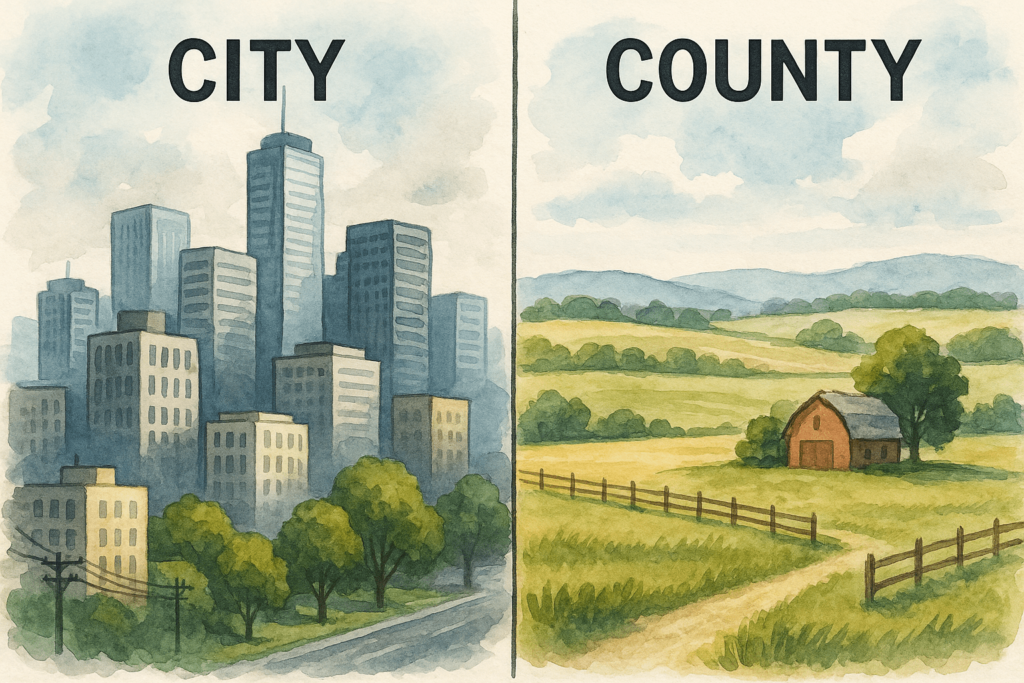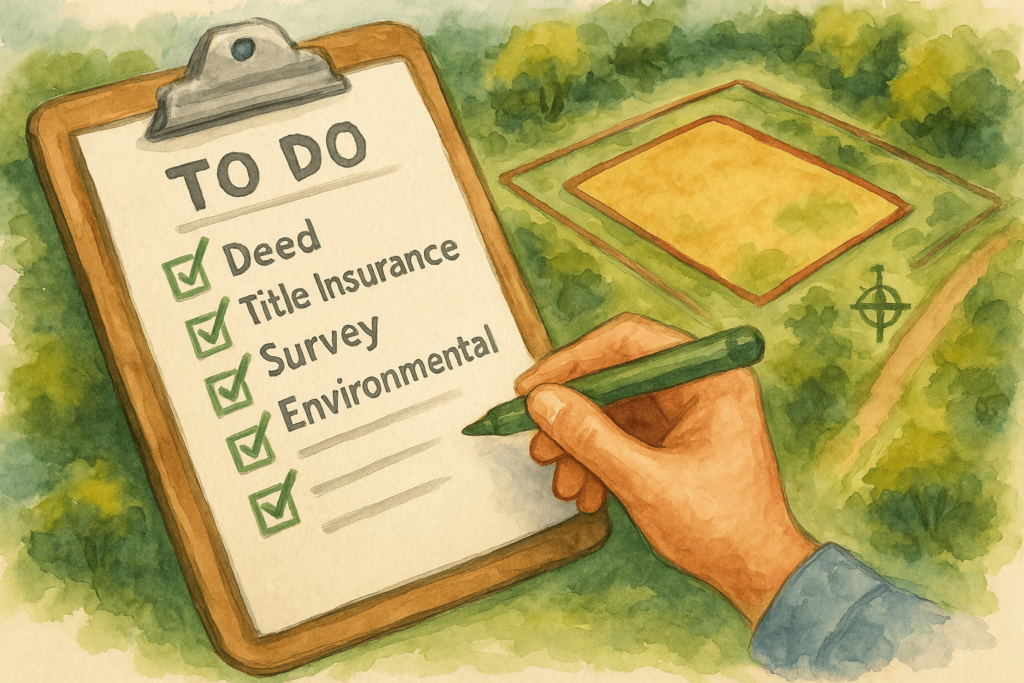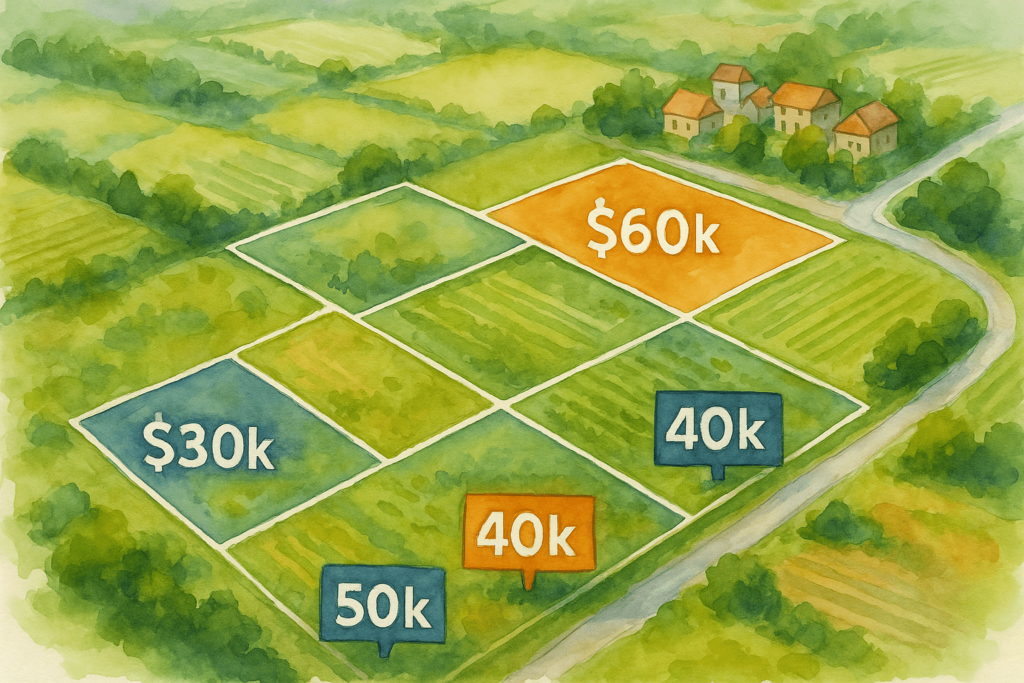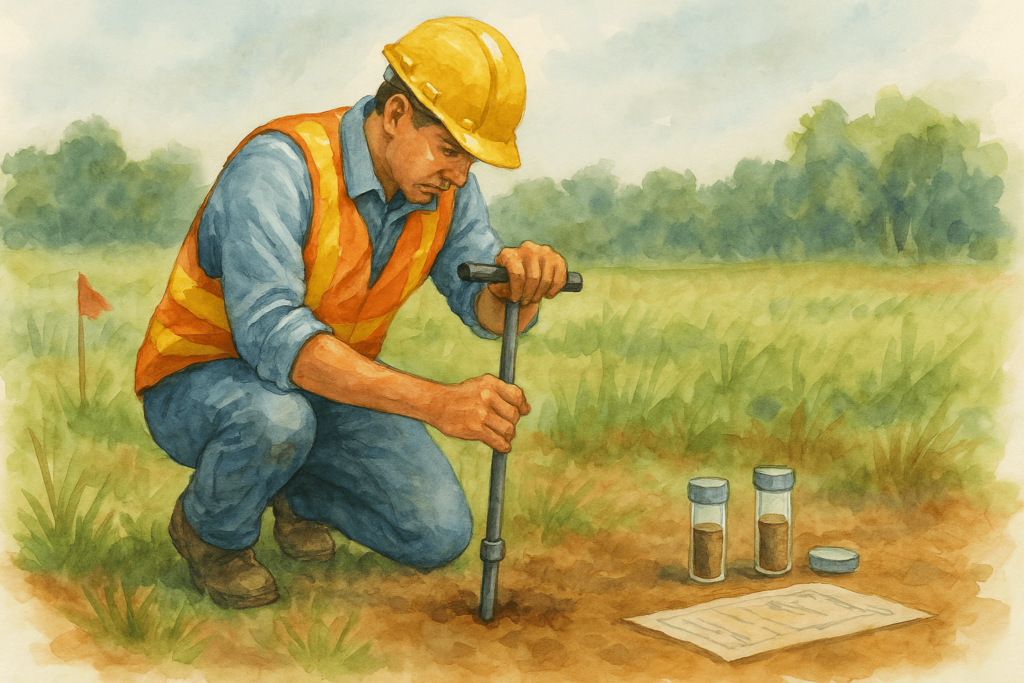Selling land to a developer can be significantly more profitable than selling to individual buyers, but it requires understanding what developers want and how to position your property effectively.
With demand for developable land at historic highs and limited inventory creating a seller’s market, now is an opportune time to explore this lucrative option. Whether you own vacant land, commercial real estate market properties, or potential land in Texas, understanding the value of your property is crucial. In the United States, property tax considerations and interest rate environments significantly impact both developer financing and land valuations. The process of selling land to developers differs significantly from traditional real estate transactions.
Why Sell Your Land Directly to Developers?
Selling land to developers offers several compelling advantages over traditional sales:
Higher Sale Prices: Developers often pay above market value because they recognize your land’s development potential. Unlike individual buyers who see raw land, developers see finished projects and calculate value based on future profitability. Current market conditions favor sellers with the right property online presence.
Creative Financing Options: Developers frequently offer alternative deal structures that can increase your total return, including installment sales with premium pricing and potential tax benefits, profit-sharing agreements where you receive additional payments when the project sells, and option agreements that provide upfront fees while securing future purchase rights. Unlike traditional mortgage financing for owner-occupancy purchases, developer transactions often involve more sophisticated financing arrangements.
Professional Transactions: Experienced developers understand the acquisition process and typically have financing readily available, reducing the risk of deals falling through. They’re also less likely to withdraw from agreements due to finding alternative properties. Their expertise in development and understanding of land transactions make them reliable partners.
Faster Sales Process: While not as quick as cash offers from wholesalers, developer sales often proceed more efficiently than traditional residential sales due to their expertise and available resources.
What Land Developers Look for When Buying Land

Understanding developer priorities helps you position your property effectively and negotiate from a position of strength. When considering selling your land, it’s crucial to understand what makes properties in your area attractive to potential developers.
Development Potential and Zoning: Current zoning designation is paramount—residential, commercial, industrial, or mixed-use zoning each offers different opportunities. Developers evaluate density allowances, building height restrictions, and the likelihood of obtaining necessary permits. Properties with existing favorable zoning or clear paths to rezoning command premium prices. Higher density zoning typically supports more units per acre, directly impacting potential returns for both developer and landowner. Mixed-use development opportunities often command premium pricing due to their versatility.
Zoning Jurisdiction: City vs. County Land: The regulatory environment differs significantly based on whether your land falls within city limits or county jurisdiction.
City Jurisdiction Properties typically feature more detailed and stringent zoning regulations, greater access to municipal utilities and infrastructure, higher development costs but potentially higher returns, more complex approval processes but established frameworks, and better access to amenities that enhance project marketability.
County/Unincorporated Areas generally have looser zoning regulations and fewer restrictions, less access to municipal utilities (may require private systems), potentially lower development costs and faster approvals, greater flexibility for larger-scale or unique developments, and appeal to developers seeking fewer regulatory obstacles.
Understanding your property’s jurisdictional context helps you market to appropriate developer types and set realistic expectations for the development process.
Location and Market Access: Proximity to transportation infrastructure, growing population centers, and existing amenities significantly impacts value. Developers analyze demographic trends, planned infrastructure improvements, and surrounding development to assess long-term market potential. The land’s appeal often depends on accessibility and how land begins to integrate with existing infrastructure.
Physical Characteristics: Size, shape, and topography affect development feasibility. Larger, regularly-shaped parcels offer more flexibility, while favorable topography (minimal grading required) reduces development costs. Access to utilities or the ability to connect to municipal services is crucial.
Financial Viability: Developers calculate potential return on investment by considering all development costs against projected revenue. Your land represents the foundation of their investment, so they evaluate it within the context of their entire project economics.
Preparing Your Land for Real Estate Developer Interest

Proper preparation significantly increases your land’s attractiveness and can command higher offers.
Essential Documentation: Compile comprehensive property information including current deed, title insurance, recent tax assessments, existing surveys, and any environmental reports. Having these readily available demonstrates professionalism and expedites due diligence. Real estate agents can help you unlock your land’s full potential by ensuring all documentation is properly organized.
Professional Land Assessment: Invest in a current ALTA survey to establish exact boundaries, easements, and potential encroachments. Consider commissioning soil reports, environmental assessments (Phase I), and utility availability studies, as these address common developer concerns upfront.
Address Title and Legal Issues: Clear any liens, resolve boundary disputes, and ensure clean title transfer. Title problems discovered during due diligence can derail sales or significantly reduce offers.
Market Research and Positioning: Research recent sales of comparable properties and understand local development trends. Identify what types of projects are being built in your area to target appropriate developers and set realistic pricing expectations. Consider ongoing property tax obligations and how they might affect both your holding costs and the developer’s pro forma calculations. When you market your land effectively, it attracts more qualified buyers.
Consider Strategic Improvements: Simple improvements like boundary clearing, basic site access, or preliminary environmental assessments can increase property value substantially—often providing returns that exceed the investment cost. Learning how to sell effectively includes understanding what type of development your land might support and how land becomes more valuable with strategic enhancements.
Finding and Connecting with Land to Developers

Success in selling to developers often depends on identifying the right buyers and making effective connections. Whether you’re selling to a developer directly or working through intermediaries, networking with local professionals can provide insights into which parties are aligned with your goals.
Research Active Local Developers: Identify developers working in your area by reviewing recent building permits, attending city planning meetings, and checking local business directories. Focus on companies building projects that align with your land’s potential use.
Evaluating Developer Credibility: Look for developers with a strong track record of completed projects in your area, adequate financial resources and established lending relationships, realistic project timelines and approval experience, positive references from other landowners and local officials, and transparent communication about their development plans. When attempting to sell your land, evaluate whether the land owner will benefit from their proposed development approach.
Red Flags to Avoid: Be cautious of developers who exhibit inadequate financial resources or inability to provide proof of funds, poor track record with obtaining development approvals, unrealistic project timelines or promises, reluctance to provide references or project examples, or overly aggressive negotiation tactics or pressure for quick decisions.
Leverage Professional Networks: Commercial real estate agents with developer relationships can provide invaluable connections and market insights. Land brokers, attorneys specializing in development deals, and planning consultants often know developers actively seeking properties. Working with a real estate professional experienced in land selling can streamline the entire selling process for landowners looking to sell.
Group Sales and Land Assembly
Consider coordinating with neighboring landowners for potentially higher returns. Developers often prefer larger assemblages for comprehensive developments, group sales typically command higher per-acre pricing, shared costs for marketing and professional services create stronger negotiating positions with larger combined acreage, and legal frameworks are available for coordinating multiple owners.
Start by talking with adjacent landowners about their interest in selling. Even informal coordination can attract developers seeking larger development opportunities.
Direct Marketing and Online Platforms: Create comprehensive marketing materials highlighting your property’s key features—location, size, zoning status, and development potential. List on specialized platforms like LandWatch and LoopNet that developers frequently use to source opportunities. When choosing to sell, consider the highest possible price you can achieve through proper marketing. Listing your property on multiple platforms increases visibility to qualified buyers.
Pricing Your Land Strategically for Selling Land to Developers

Accurate pricing balances maximizing return with attracting serious developer interest.
Understand Developer Valuation Methods: Developers use residual land valuation—calculating backward from projected profits after accounting for all development costs and desired returns. Your land cost typically represents 15-25% of total project costs.
Analyze Comparable Sales: Research recent land sales in your area, focusing on properties with similar size, zoning, and development potential. Pay attention to price per acre trends and any unique features that commanded premium pricing.
Consider Development Potential: Higher-density zoning allowances generally support higher land values. Understand your property’s buildable square footage or unit capacity, as this directly impacts developer interest and pricing.
Professional Appraisal: Commission an appraisal from someone specializing in development land. They’ll analyze highest and best use scenarios and provide market-based valuations that support your pricing strategy. A professional can provide insights into current market trends and help you understand if your vacant land has development potential.
Market Timing Factors: Consider current economic conditions, interest rates, and local market demand. In strong markets, developers may pay premiums for quality sites, while challenging conditions require more competitive pricing. Rising interest rates can affect developer mortgage availability and project financing, potentially reducing their ability to pay premium prices.
When NOT to Sell: Certain conditions suggest waiting might be more profitable, including rising interest rates making development financing expensive, local market oversupply of your intended development type, economic uncertainty reducing developer activity, pending infrastructure improvements that could significantly increase value, or recent zoning changes that haven’t been reflected in market pricing yet. Smart investors understand that timing can significantly impact returns.
Monitor these indicators and consider timing your sale to optimize market conditions.
Negotiating with Developers to Sell Land to a Developer

Successful negotiations require understanding developer motivations and protecting your interests throughout complex transactions.
Key Contract Terms in the Negotiation
Focus on purchase price and payment structure (consider installment sales or earnest money that builds over time), due diligence periods (extended periods of 90-180 days are common but should have defined milestones), contingencies (developers often require contingencies for zoning approvals, environmental clearance, and financing), and earnest money deposits (ensure substantial deposits that escalate over time to maintain buyer commitment). Landowners and developers must work together to ensure the sale of your property proceeds smoothly.
Common Deal Structures: These include straight purchases (traditional sale with extended due diligence), option agreements (developer pays for exclusive purchase rights within specified timeframe), profit participation (receive percentage of profits from final development sales), and phased purchases (partial payments tied to development milestones).
Understanding Option Agreements: Option agreements can provide additional income while securing future sales. They typically involve option fees of 2-5% of purchase price paid upfront and applied to final purchase, option periods usually lasting 6-24 months giving developers time for approvals and financing, clear exercise terms for when and how developers can exercise the option, and extension provisions with terms for extending option periods often with additional fees.
Options work well when developers like your property but need time for due diligence, or when you’re not in a hurry to sell but want to secure a future buyer.
Negotiation Strategies: Never accept the first offer without negotiation—developers typically build margin into initial proposals. Understand their vision for your property and align your terms accordingly. Be patient but decisive, as developers appreciate landowners who understand the development process.
Professional Representation: Work with attorneys and commercial agents experienced in developer transactions. These deals involve complex contracts requiring specialized knowledge that differs significantly from residential real estate.
Navigating Due Diligence and Closing the Deal

Developer transactions involve extensive investigation periods and complex closing processes.
The Due Diligence Process: Expect comprehensive property investigations including environmental assessments (Phase I and potentially Phase II), geotechnical soil reports, utility capacity studies, and traffic impact analyses. Developers may also conduct market studies and seek zoning confirmations or modifications.
Managing the Timeline: Due diligence periods typically last 90-180 days, with developers often requesting extensions. Build protections into contracts including deadlines for specific milestones and provisions for re-negotiation if new issues arise. Understanding market conditions and when the land is suitable for development helps set realistic timelines.
Closing Preparations: Work with title companies experienced in development transactions. Prepare for complex documentation including environmental warranties, development restrictions, and potentially ongoing obligations. Ensure all permits, surveys, and reports are current and accessible. The closing the deal process requires careful attention to every detail.
Professional Support Team: Assemble a team including a commercial real estate attorney, tax advisor familiar with land sales, and experienced commercial agent. Development transactions involve unique legal and tax considerations requiring specialized expertise.
Common Pitfalls to Avoid When Selling to Developers

Unrealistic Valuation: Avoid overpricing based on comparisons to smaller retail land sales. Developers buy larger tracts and factor in development risks, typically paying 15-25% less per acre than individual buyers might for smaller parcels.
Inadequate Documentation: Missing surveys, unclear title, or incomplete environmental information can derail transactions or significantly reduce offers. Invest in proper documentation upfront.
Ignoring Market Timing: Land development is cyclical. Economic conditions, interest rates, and local market trends significantly affect developer interest and pricing. Consider market timing in your sale strategy.
Poor Contract Terms: Avoid contracts with unlimited due diligence periods, inadequate earnest money, or terms that heavily favor the developer. Ensure balanced agreements that protect your interests.
Rushing the Process: While you shouldn’t delay unnecessarily, avoid pressure to accept quick offers without proper evaluation. Take time to research comparable sales and understand your property’s true potential.
Legal and Tax Considerations to Help You Sell Land

Understanding the legal and financial implications of selling to developers helps protect your interests and optimize your return.
Tax Planning Strategies: Land sales often trigger significant capital gains taxes. Consider 1031 exchanges to defer taxes by reinvesting in similar property, installment sales to spread tax liability across multiple years, or charitable remainder trusts for high-value properties. Consult with tax professionals familiar with real estate transactions to explore options specific to your situation.
Environmental Responsibilities: Developers conduct thorough environmental due diligence. Address known contamination or environmental issues proactively, as these can significantly impact negotiations or derail transactions entirely.
Ongoing Obligations: Some sales include post-closing obligations including development timeline participation, deed restrictions, environmental warranties, access easements, and utility easements. Understand any long-term commitments before signing contracts, and negotiate limitations on post-sale obligations where possible.
Legal Documentation: Work with attorneys experienced in development transactions to review purchase agreements, which often include complex contingency clauses, development timelines, and dispute resolution procedures. Understanding the legality of all contract terms protects your interests throughout the transaction. When you sell your land to developers, proper legal documentation is essential for protecting your interests.
Maximizing Your Property’s Development Value
Strategic Improvements: Consider investments that significantly increase development appeal, such as boundary surveys and environmental assessments, preliminary site planning or engineering studies, utility access improvements or road upgrades, and zoning modifications or special use permits. The key is identifying improvements with returns exceeding their costs—often infrastructure-related enhancements provide the best value.
Timing Your Sale: Monitor local development trends, economic conditions, and infrastructure improvements that might increase your property’s value. Sometimes waiting for nearby developments or infrastructure projects can substantially increase sale prices. Consider how you can unlock the full potential of your timing strategy to help you sell land at the optimal moment.
Alternative Approaches to Consider
Working with Land Brokers vs. Direct Sales: While direct sales eliminate commission fees, experienced commercial land brokers bring valuable expertise, developer networks, and negotiation skills. Consider broker representation for complex transactions or high-value properties where their expertise can yield better net returns.
Group Sales and Land Assembly Strategies: Coordinating with neighboring landowners can significantly increase everyone’s returns. Developers often pay 20-40% more per acre for larger assemblages, costs are shared for marketing and professional services, collective negotiating positions are stronger, and access opens to developers who only consider larger projects.
Coordination approaches include informal cooperation (simply coordinate timing and marketing), formal land assembly agreements (legal contracts binding multiple owners), single entity sales (form LLC or partnership to own and sell collectively), and sequential sales (coordinate individual sales to same developer).
Alternative Buyers: If developer interest is limited, consider land investment companies seeking future development opportunities, adjacent property owners looking to expand, conservation organizations or government agencies (for certain property types), agricultural investors (for rural properties), or recreational land buyers (for properties with natural amenities). Each type of investor or buyer may have different priorities regarding owner-occupancy versus investment potential. Understanding how to market property to developers versus other buyers helps optimize your approach.
Conclusion
Successfully selling land to a developer requires thorough preparation, realistic pricing, strategic marketing, and skilled negotiation. The key elements for success include understanding your property’s development potential and positioning it effectively, preparing comprehensive documentation and addressing potential issues proactively, pricing competitively based on developer valuation methods and comparable sales, building relationships with active developers through professional networks, negotiating balanced agreements that protect your interests while meeting developer needs, and working with experienced professionals throughout the transaction process.
With proper planning and execution, selling to developers can provide excellent returns while contributing to community growth and development. The time invested in understanding the development process and positioning your property strategically often pays significant dividends in the final transaction value.
Remember that land sales to developers are complex transactions requiring patience, preparation, and professional guidance. By following the strategies outlined in this guide and working with experienced advisors, you can maximize your property’s value while ensure a smooth and successful transaction.
